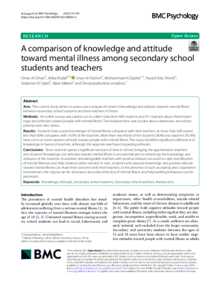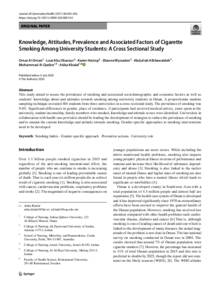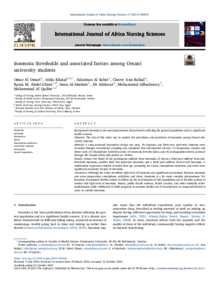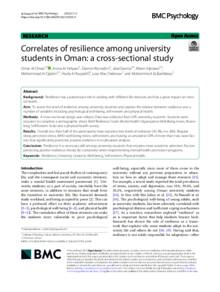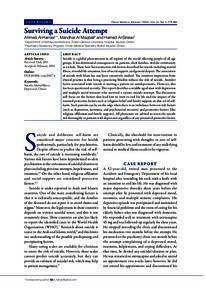Document
A comparison of knowledge and attitude toward mental illness among secondary school students and teachers.
Identifier
DOI: 10.1186/s40359-022-00820-w
Source
BMC Psychology. v. 10, 1, 109
Contributors
Khalaf, Atika., Author
Al-Hashmiah, Iman., Author
Al-Qadire, Mohammad., Author
Shindi, Yousef Abu., Author
Al-Sabei, Sulaiman., Author
Matani, Nasir., Author
Jesudoss, Devanprabudoss., Author
Country
United Kingdom.
City
London
Publisher
BioMed Central Ltd.
Gregorian
2022-12-01
Language
English
Subject
English abstract
Aim: The current study aimed to assess and compare the level of knowledge and attitude towards mental illness between secondary school students and their teachers in Oman. Methods: An online survey was carried out to collect data from 400 students and 411 teachers about their knowledge and attitudes toward people with mental illness. Two independent case studies about depression and schizophrenia were also tested. Results: Students have a poor knowledge of mental illness compared with their teachers, as more than half scored less than 60% compared with 16.5% of the teachers. More than two-thirds of the students (80%) and teachers (76.4%) have a low or minor positive attitude toward people with mental illness. The study identified significant differences in knowledge in favour of teachers, although the opposite was found regarding attitudes. Conclusions: Since students spend a significant amount of time in school, bridging the gap between teachers' and students’ knowledge and attitudes toward mental illness is an essential part in enhancing the knowledge and attitudes of the students. In addition, knowledgeable teachers with positive attitude can assist in early identification of mental illnesses and help students when needed. In turn, students who possess knowledge and positive attitude toward mental illness can share their concerns with their teachers. In the presence of such accepting and cooperative environment, the stigma can be decreased and early detection of mental illness and help-seeking behaviour can be promoted.
ISSN
2050-7283
Category
Journal articles

